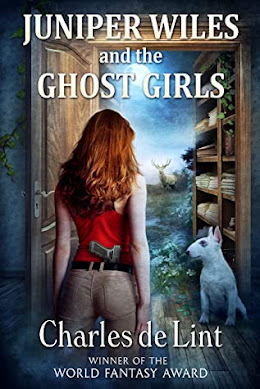Triskell Press, ISBN 9781989741054, November 2022
Juniper Wiles, former actor who starred as the plucky teen detective Nora Constantine, was dragged back into the Nora Constantine world in a previous book, Juniper Wiles, when it started to bleed into Newford, starting with her meeting with the ghost of a murdered young man. She survived that adventure, but decided that she didn't want to be a detective, teen or otherwise. And she's certainly no Nora Constantine.
But having learned that she can see and talk to ghosts, and that they all have unresolved problems they want to solve, she can't always say no when they ask her for help. Yet while she often helps, she has no interest in making it the focus of her life.
Then Christy persuades her to come to a meeting at the police station, with Captain Sam Cray, head of the Newford Police Department's Paranormal Investigations Task Force. Christy consults for the part of the police that's informally called the Spook Squad, and Cray is having a problem that involves ghosts. Juniper is there only as a reluctant favor to Christy, and Cray is angry that Christy has brought "an actress" who only thinks she's something because she played Nora Constantine. He's offensive enough about it that she decides to walk out, but Christy persuades her to stay, and Cray to at least show her the problem.
Soon Juniper has met the "ghost girls" tied to box taken from a house that was being plagued by what seemed to be a poltergeist. They can't open the box, and no one can see or hear any ghosts--except, when she enters the room, Juniper. Soon she has promised the girls that she'll do her best to solve their problem of being trapped by the box---and find their killer, who got each of them, over several decades.
That would be enough of a problem, with no real clue who the girls are or when and where they were killed, but this is Newford, and Juniper has a reputation of helping people who aren't part of the everyday world. She meets a young man who isn't a ghost, but rather an Eadar Duncan Fairweather, one of the young mages studying at Kingsmoor College, wants her to find his missing sister, also a mage student, called Daisy Fairweather. Getting this information clear takes a few minutes, because Juniper isn't one of the fans of either the books or the movies based on them, and doesn't even recognize their names. She agrees to do some preliminary investigation and decide if she'll be able to help him.
Soon Juniper is doing exactly what she doesn't want to do--two investigations that become dangerous and high-stakes, sometimes involving her friends, especially the all too willing Jilly Coppercorn, into events Juniper things are too dangerous for her gentler friends. She's happy to have the assistance of Joe, the shapeshifter "cousin," and Christy's sister Christiana after she learns more of Christiana's abilities, but she's also not at all sure she likes who she becomes when she's dealing with genuine bad guys--such as the killer of the ghost girls.
And things don't get better with Cray. They get worse. When he figures out he really needs Juniper's help, he wants a pro forma apology for his rudeness and insults to wipe the slate clean, and then dictate how she's going to help him and how it will work. Juniper does not respond well to this, and Cray becomes another problem she and her allies have to deal with, while hunting a a killer and looking for a missing woman. Along the way, she learns a lot about herself, her friends, and also about the reputation she's already earned in parts of the magical world she has till now been only marginally aware of, from listening to Jilly, Christy, Joe, and other friends. De Lint's character development is never less than excellent, and we see him doing his good work here.
On that note, it would be wrong not to say a bit more about Sam Cray. I don't like him, but he's understandable. Several characters in the book say he's "not a bad guy," but I really don't like him. He does have some painful events in his past that make his behavior understandable--but it is at best an unhealthy reaction. Charles de Lint says in an afterword/intro to the bonus short story about the beginnings of the Spook Squad, that Cray is "not a bad guy."
And I read the bonus story, and it's good, and I still don't like Sam Cray. Perhaps that's my past experiences, that give me a low tolerance for people who think they can tell me what to think and feel, and want pro forma apologies to wipe the slate clean, without anything really changing.
Highly recommended.
I received this book as a gift, and am reviewing it voluntarily.

No comments:
Post a Comment